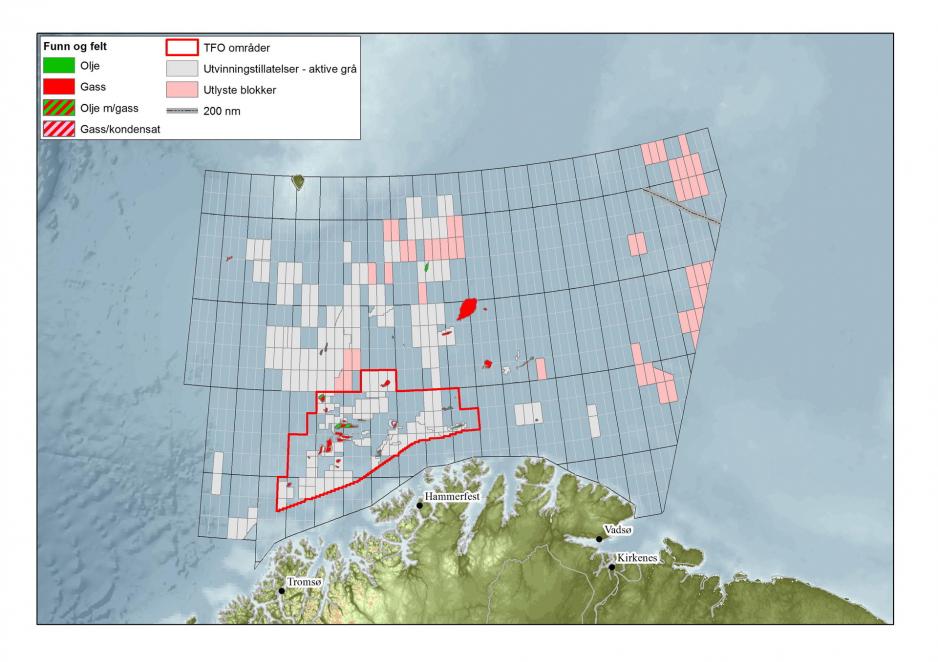Arne O. Holm says: The Political Oil Decisions Resemble A Rave Party with High Drug Factor

Here is the southeastern Barents Sea, which was to make us rich and increase population figures in Finnmark. (Illustration: The Norwegian Oil Directorate)
Commentary: There is something highly symbolic about the Norwegian parliament, Stortinget, yesterday choosing to close its doors when seeking an explanation for the NOK 200 billion Equinor collapse in the USA. Coincidentally, that happened at the same time as news broke that the Norwegian Ministry of Oil and Energy a few years ago manipulated its way into opening southeastern parts of the Barents Sea for oil exploration.
We were not meant to know about that move either.
If northerners look north and outwards, we look straight into the disputed exploration territory of the southeastern Barents Sea. Disputed for both economic and climate reasons.
It was meant to be the gateway to a reinforced North Norwegian participation in a continued oil adventure. Not only was the state to fill its treasure chest to the benefit of all; new jobs were to be created too – so many that the population figures in Finnmark county were to boom, as if by magic.
More inhabitants in Finnmark and more jobs is irresistible for most people with an interest in the High North.
Now, seven years later, we know that that was not the case at all.
Protected like infants
Profitability calculations from the Ministry of Oil and Energy, at least those provided by the Ministry, would have failed even during the first week of any business academy.
Today, we know that more competent number-crunchers in the Ministry and the Directorate nevertheless had done their homework. However, we also know that these numbers were hold back to decorate the realities.
We were not supposed to find out that either
Thus, yet another part of the Norwegian oil adventure falls into the hands of investigation committees, without that being likely to have any consequences, nevertheless.
Because our oil directors are our best paid business leaders and boast infinitely of their own competence. At the same time, they are protected as if they were infants by the ministers in charge when the results of their incompetence is laid bare.
The punishment is worth gold
The punishment for having wasted billions of public funds is retirement agreements and bonuses so gigantic that they could have funded many of the disused rural schools cried over by Agrarian Party member Ola Borten Moe at his election rallies.
I do not pick this example at random.
Ola Borten Moe is the former Minister of Oil and Energy who claims not to have known that oil exploitation in the southeastern Barents Sea would not be profitable when presenting his calculations for an apparently unknowing parliament.
Now, the former Minister says that it would not matter anyway that parliament was not informed about the economic calculations demonstrating the minute chance for the project to ever become financially successful.
“This is kind of a proxy debate in which those who always oppose petroleum exploitation argue that terrible mistakes have been made, however, they are opposed to such exploitation even when it is profitable too”, Borten Moe says to NRK.
That is the speak of a politician who comes from a party that has made the battle between the people and the elites its winning cause.
I have taken some time to read the “historic” documents that formed the basis for parliament’s decision, as well as the later announcement papers for the southeastern Barents Sea licensing round. The information, deemed insignificant by the former Minister, is about whether so-called “net present value” formed the basis for the decision; the only sensible way in which to calculate an investment. This is basic knowledge and should also be that to people who live well off on spending other people’s money.
Insignificant?
Instead of presenting such calculations, they were taken out of the impact analysis. A recently published mail exchange shows that the Ministry instructed the Oil and Energy Directorate to remove information indicating lack of profitability.

“This is kind of a proxy debate” says former Minister of Oil and Energy Ola Borten Moe when asked about why the ministry withheld information
Even parliament places a lid on information
The Government Attorney has had the sense and integrity to admit both that the documents exist and should be presented, last so during a court case about oil exploration in the High North.
The then-Minister still argues that it carried no significance for parliament’s processing of the case.
However, there are more strange things in the government, and also in parliament’s lacking vigilance, regarding this decision.
The southeastern Barents Sea was opened to exploration at a time when the oil price was a at a record-high $120 per barrel.
That, along with the lack of present value estimations, construes a potential profitability.
However, the licenses are only announced in 2016 – when the oil price had dropped to $45 per barrel.
Will not budge an inch
Without political Norway taking a step back, without the Oil Director budging an inch, without it having even the least consequence for the calculators at the Ministry and the Directorate for Oil and Energy.
In other documents circulating the political community at the time, the alleged population growth that was to benefit Finnmark was also part of the argumentations.
Those who want to check how it turned out can turn to Statistics Norway’s population figures for Finnmark.
Towards the end of the 1980s, I and many other journalists worked on revealing the oil scandal of that day, the Mongstad Oil Refinery. Then, too, Statoil [today: Equinor] withheld information about a giant budget overrun. CEO Arve Johnsen had to go, and the NOK 6 billion overrun was to forever enter the Norwegian vocabulary as ‘one Mong’.
The explanation for the Mongstad scandal is a blueprint of the cases currently being rolled out in the USA as well as in the Barents Sea.
Secrecy
Though ‘rolled out’ does not even begin to cover it. Even parliament places a lid on information.
It is about erroneous technical assessments, lousy project management and lack of planning. And about our having to learn from the mistakes that have been made.
Lessons learned is the last thing one finds from these massive blunders
During the Mongstad scandal, then-Oil and Energy Minister Arne Øien fought an intense fight for the budget overruns to not have any consequences for Statoil’s management, neither its board nor administration. On the contrary, he managed to say, because management due to the scandal it was very much to blame for possessed a quite unique competence, which would be irreplaceable.
Øien nevertheless lost the battle about positions, eventually.
Meanwhile, incompetence continued to rule the ground on the Åsgård field, in the USA and now also the southeastern Barents Sea, to name but a few examples.
All decisions made on what most of all resembles a financial rave party with high drug factor.
Lessons learned is the last thing one finds from these massive blunders
Oil and Energy Minister Tina Bru will not comment on the factual foundations for the issue of developing the southeastern Barents Sea, as it did not happen on her duty.
No, she is right about that.
The janitors quickly disappear from the public limelight and into their lucrative retirement packages and financial parachutes as scandals appear.
A few of them nevertheless reappear later on, such as Ola Borten Moe, to tell us that calculations are insignificant. It is all about whether or not you support petroleum exploitation, he argues.
No, it is not. Not at all.
But with his statements he makes it all the harder to defend an industry, a state-owned petroleum company and a Ministry who are constantly on collision course with reality.
This commentary was originally published in Norwegian and has been translated by HNN's Elisabeth Bergquist.

